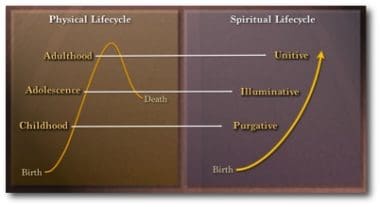The Three Ways: Longing for the Face of God
Navigating the Interior Life (Part III of IV)
In our first post of this series we covered an introduction to the concept of the three ways of the interior life. In part II we covered the first of the three ways. In this post we will continue to focus on a summary of the second phase, the Illuminative way. If you have not yet read the previous posts, you might want to; this post is not likely to be well understood without context. For easy reference and orientation I have again provided the illustration that compares the human to spiritual development lifecycle here:
The Illuminative Way (Spiritual Adolescence):
The soul in this phase is characterized by purposeful and consistent growth in prayer, virtue, love of neighbor, a deeper awakening of the mind and heart in the ways of God, and an increasingly clear understanding of God’s will as it applies to its particular state of life. At this point, the struggle to overcome habitual sin, both mortal and venial, and resulting increase in moral stability has, for the most part, been won.
The soul here also has an ever-deepening desire for the heights of union with God and purity in thought, word, and deed. This phase is often preceded or occupied with significant suffering and purifications known as the dark night of the soul. However, the soul is also comforted with consolations from God that sustain it through difficult times. It is also common to find mystical phenomena beginning to emerge in the late purgative phase and in this phase.
The properly aimed soul in this phase (as illumined by St Teresa of Avila in the third mansion of The Interior Castle, chapter one, paragraph five) longs to avoid offending “…His Majesty, even guarding themselves against venial sins; they are fond of doing penance and setting aside periods of recollection; they spend their time well, practicing works of charity toward their neighbors; and are very balanced in their use of speech and dress and in the governing of their households – those who have them.”
To better understand this phase we will use three stages of progress from Chautard with minor modifications: 1) Fervor; 2) Relative Perfection; and 3) Heroic Perfection. It is worth noting that this third category is often the key outward indicator that the pilgrim is in transition into the final phase of spiritual perfection.
Fervor
Venial Sin: Never deliberate but with surprise, sometimes, or with imperfect advertence. Keenly regretted and serious reparation made.
Imperfections: Wants nothing to do with them. Watches over them and fights them with courage and diligence in order to be more pleasing to God. Still, imperfections are sometimes accepted, though regretted at once. Frequent acts of renunciation. Their practice of a particular examen aims at perfection in a specific virtue.
Prayer: Vocal prayer is practiced diligently on a daily basis and mental prayer is constantly practiced and gladly prolonged. Prayer is often affective and the prayer of simplicity and infused contemplative prayer begins to emerge if not already present in the late purgative phase. The soul often experiences alternations between powerful consolations and fierce trials.
Sacraments: Fervently participates in weekly and daily Mass if able. Pursues confession on a regular schedule and often weekly. Imperfections are offered in confession for the purpose of obtaining the grace necessary to overcome them (i.e. devotional confession).
Relative Perfection:
Imperfections: Guards against them energetically and with much care and love. They only happen with half-advertence.
Prayer: Habitual life of prayer, even when occupied in external works. Thirst for self-renunciation, annihilation, detachment, and divine love. Hunger for the Eucharist and for Heaven. Graces of infused contemplative prayer are common and of differing degrees of intensity and usually accompanied by passive purifications.
Heroic Perfection:
Imperfections: Nothing but the first impulse.
Prayer: Supernatural graces of infused contemplation sometimes accompanied by extraordinary phenomena. Pronounced passive purifications. Contempt of self to the point of complete self-forgetfulness. Prefers suffering to joys in a desire to join with Christ in his work of redemption.
In contrast to those in the purgative stage, one key aspect of progress in the illuminative phase is that the soul becomes increasingly simple and childlike. The reason for this reality is that at this stage habitual sin has faded to the background and the person is generally becoming more integrated internally and externally. This reality minimizes duplicity and complexity in the personality and results in a much greater degree of peace and ease with respect to those who are graced to encounter them. Other key elements are that the ability to selflessly love others and discern God’s will dramatically increase in this phase. These aspects do not reach relative perfection until the final phase but they do clearly manifest themselves here especially in the latter half of this period of development. All in all, souls in this phase are clearly on a trajectory toward sainthood.
For those hungering for more on this topic, I will provide a two hour interactive webinar on the evening of Friday November 1st, 2013. Seats are limited so click here to register now. Participants do not need to know anything about this topic in order to join the webinar and are free to simply listen rather than interact if so desired.
In our final post we will explore the unitive way and beyond…
Also, to learn more, the best modern and reasonably in-depth treatment dedicated to this topic is entitled, Fulfillment of All Desire by Ralph Martin. For a personally applicable summary, see my recent book, Navigating the Interior Life, Spiritual Direction and the Journey to God.






